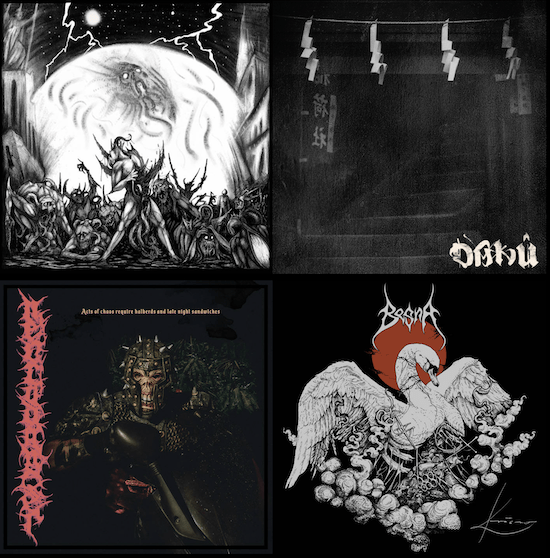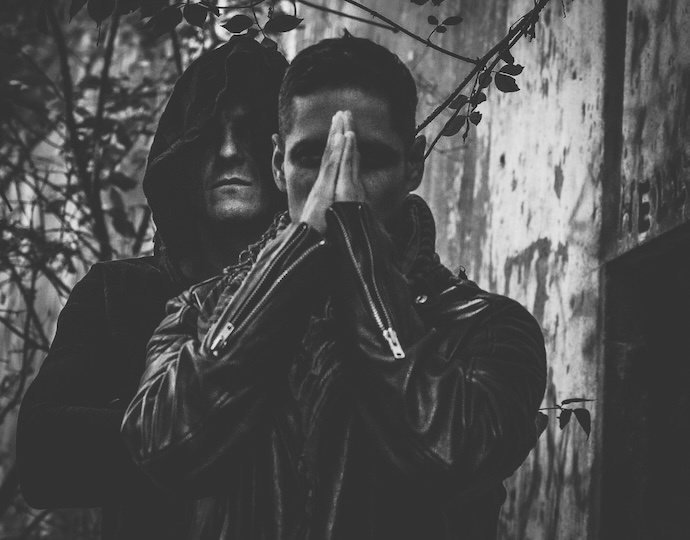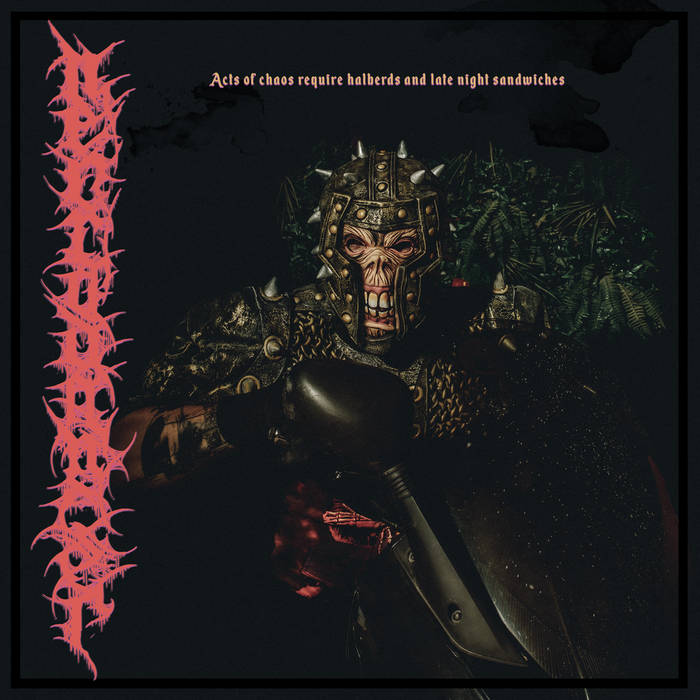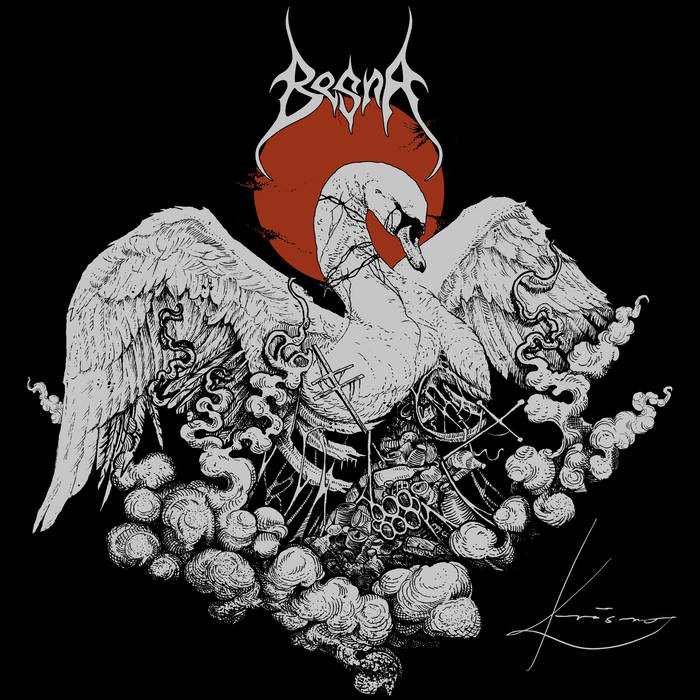
(written by Islander)
What is the correct adjective for the genre of music known as Black Metal? Is it “blackened“? I think not. “Blackened” is a word I often see applied to the music of bands who play something other than Black Metal but add ingredients that people think are drawn from Black Metal, even if it’s nothing more than shrieks, blizzard-like tremolo riffs, or blistering blasts, even though none of those elements is unique to Black Metal.
So if “blackened” really isn’t right, then what is? Other adjectives commonly used to describe Black Metal are even less specific to the genre — words like “grim,” “cold,” “nihilistic,” “misanthropic,” or “kvlt,” and for some kinds of Black Metal they don’t fit very well at all.
How about “Black Metallic“? Linguistically, it appears to be accurate; “metallic” is an accepted adjective for things relating to or being a metal, and there’s also an accepted definition of “metallic” that refers to “having a harsh or rasping sound.”
There’s a risk that if “Black Metallic” were accepted, it could become a noun. After all, the term “Classical Music” originally might have been intended as an adjectival phrase but is now a noun, and has been for a very long time. But I don’t think it would be terrible if people used “Black Metal” and “Black Metallic” interchangably. Of course that will never happen.
As for why I’m thinking about a question that’s completely unimportant, you would think I had too much time on my hands this morning. But I was really just postponing the always-difficult decision about what to include in this Sunday compendium. It didn’t take much to send me off in this direction, just a link from Milǒs to a song called “Black Metallic.” Turns out it’s not Black Metal, but instead the lead single off Catherine Wheel‘s 1992 debut album Ferment.
Maybe I heard it or saw the video way back then, but I don’t remember. I did some searching in an effort to find out why Catherine Wheel named the song “Black Metallic,” and these interview excerpts are as close as I came to finding out. It seems to have been a PR-driven revision of a song originally called “White Albino” that was inspired by Marilyn Manson, but as for why the name “Black Metallic” was chosen, frontman Rob Dickinson confessed that he didn’t really know. In the lyrics the phrase refers to the color of skin, a replacement for “your skin is white albino,” but he seems fairly clueless about why that replacement was chosen.
It doesn’t seem to have had anything to do with the band’s conception for the sound of the music, though I do find the song sinister and it does get pleasingly intense eventually. I was hoping the video would include someone with Black Metallic skin, but no.
Well, enough foot-dragging and procrastinating. Here’s some Black Metallic music I selected for today:

RUINOUS POWER (Canada)
Once again I, Voidhanger Records has recently announced four new albums for pre-order with one song each available for streaming. I jumped at the one from the debut album of Ruinous Power because the band’s lineup includes guitarist Sebastian Montesi and bassist Shawn Haché from Mitochondrion, Egregore, Auroch (and more), plus drummer Brayden Turenne; all three of them are credited with vocals too.
This song, “What of Sacred Mars?”, is the album opener, and it’s a long one. The song’s title could refer to the planet, but based on the music I think it more likely refers to the God of War. But it’s not merely violent — though it definitely is that — it’s also a frantic head-spinner and a chilling mesmerizer.
The song’s rapidly blurting notes and brutally hammering drum patterns make for hooks, and those ingredients strangely stitch things together, but in between their appearances the music maniacally darts, despondently flows, enticingly swirls with finger-tapped fluidity (a huge hook of a different kind), dismally oozes, rings dissonant chimes, and undergoes many sudden tempo changes — always backed by inventively flexible and often eye-popping drum-and-bass work, and occasionally fronted by a changing cavalcade of distorted guttural proclamations and torrid screams.
The music often flies into crazed, technically impressive frenzies, but it also drags us into a grim but somehow beautiful realm of agony (where the throb of the bass and the thump of the drums set another hook) and eventually it makes room for a dire and disconcerting closing phase that’s hypnotic.
Hell, I found the entire song mesmerizing, in every one of its changing phases.
The album’s name is EXTREME DANGER: Prototype Weaponry. It has a release date of February 28th.
https://i-voidhangerrecords.bandcamp.com/album/extreme-danger-prototype-weaponry

DAKÛ (Poland)
My next selection today is Endless, the debut EP by the Polish duo Dakû. The band announced it with these words:
Endless empires, nations and powers have raised and thrived by destroying, exploiting, enslaving others.
Endless people have been massacred due to the thirst of power, riches and wealth.
Endless…
The EP includes five tracks, each of them identified with only Roman numerals. They call it “Post Apocalyptic Atmospheric Black Metal.” “Post-Black Metal” is also a decent label for the music, but only because that label is so amorphous. This EP is indeed outside the more orthodox bounds of Black Metal, and fascinating in its elaborate changing sounds and moods.
The malicious charring snarls in the vocal department are Black Metal in tone and temperament, and the band occasionally do attack with shrill or grimly-drilling flurries of corrosive riffage and plundering drums, but you’ll discover very quickly that they also suddenly shift into slower phases when the guitars enticingly ring like chimes, the bass expresses not only weight but warmth, and the drums create steady rocking grooves, sometimes accompanied by shimmering sonic clouds or tinkling keys.
There’s shoegaze-like riffing in the songs too, straddling a tonal line between caustic and clean, as well as strummed chords and meandering notes that channel emotional pain, still backed by that big and always welcome bass and those nuanced but always viscerally compelling beats.

The final three songs are even more multi-faceted. In “III,” shivering and glistening cosmic synths play a role, along with brittle piano keys, wailing violins, and ghastly growls, all joining together to create a depressive but elegant, and ultimately savage, experience.
“IV” melds together ominous undulating undercurrents, vividly dancing notes which sound like they’re performed on an old acoustic instrument (like a balalaika?), two-toned chants, and fervent singing.
And “V” brings back those vivid trilling and dancing acoustic tones, but also dense waves of dire riffage, ugly snarls, a grim and grieving march, and a sad piano interlude to break up the doomed trudge. Near the end, the drums thunder, the bass vividly throbs, and the guitar shivers and swirls in piercing manifestations of pain and hopelessness.
The EP was released on January 15th. I think it’s exceptional. It’s on several streaming platforms linked below, but sadly not on Bandcamp. I’ll also share the introduction the band provided for themselves in an e-mail I received:

Dakû is a melodic, atmospheric black metal project, self-defined as post-apocalyptic black metal. Dakû’s music speaks of despair, melancholy, frustration and anger at humanity, which is inexorably rushing towards its own destruction due to eco-cycle, climate change, social injustice and greed; slowly destroying the planet and civilization. The name Dakû comes from the Mixtec word “ndakûu”, which means “to die as a result of doing something wrong”. The project started as a solo of project Vlad (MuuT, TIED), who was later joined by Mati (MuuT, Seminomadic, Morbus, MIAM) on drums.
The band members of Dakû, together with the MuuT band, had the pleasure of performing at Summer Dying Loud XV and Mystic Festival, among others.
Line-up:
Vlad Guzmán – lead vocals, bass, guitar, keyboards, synthesizers
Mateusz Pacholczyk – drums, backing vocals
The album was recorded by Vlad Guzman, a Mexican vocalist and multi-instrumentalist who has been living in Poland for several years. Interestingly, he speaks several languages fluently and is of Mixtec descent, which is why both Muut and Daku‘s work includes many references to Mixtec culture and mythology. On the Endless EP, he is supported by Mateusz Pacholczyk as back vocalist and drummer.
https://distrokid.com/hyperfollow/dak27/ep-endless
https://open.spotify.com/album/0osfHjz0H4WFrnL3vnhSJM
https://www.facebook.com/daku.bm
https://www.instagram.com/daku_bm/

NECRODANCER (France/Belgium)
Maybe it was because Dakû had already pulled me outside the more conventional bounds of Black Metal, but I found myself quite ready for what Necrodancer have done in their just-released single “The Ritual.” Admittedly, it’s more fun-loving than Dakû‘s music — and for that reason some of you might not be open to it.
But no matter how grim your tastes, I suspect you’ll have trouble keeping your muscles still while you experience the compulsive beats and feverishly throbbing bass-riff that launch it. The feverish pulse of the guitars, and even the sprightly notes they contribute, are also infectious — but thankfully, the gritty baying and screamed vocals are savage (even though there’s also a bit of singing).
Lots of other joyfully freakish things happen within the song (which is also a pretty good description of the video), and hearing it, I get why the band named themselves Necrodancer.
If you’re grim about your Metallic Black, you probably won’t like the name of the EP that includes “The Ritual“: Acts of Chaos Require Halberds and Late Night Sandwiches. It will be released on February 14th by Frozen Records, which describes the music as “Blackened Raw Punk” and recommends it FFO “Poison Ruïn, les albums Punk de Darkthrone, Okkultokrati.”
https://frozen-records.com/collections/necrodancer
https://necrodancer.bandcamp.com/album/acts-of-chaos-require-halberds-and-late-night-sandwiches
https://www.facebook.com/necr666dancer/

BESNA (Slovakia)
I thought for sure I had written something about one of the advance tracks from Besna‘s new album, but it seems I didn’t. I must have gotten diverted. Like a yelping dog prone to running after passing cars, sometimes it doesn’t take much. And now, as of January 16th, the whole album is out.
I was a fervent fan of Besna‘s 2022 debut album Zverstvá (I even included a song from it on our list of 2022’s Most Infectious Extreme Metal Songs), and I’m a big fan of this new one, Krásno (which means “Beauty”). Lamentably, I haven’t found or made enough time to give it a proper review. This will be more like firing off a gun to get your attention and yelling “GO LISTEN TO THIS!”
Since I started off today with a silly discussion of labels, I’ll note that the label most often affixed to Besna is Progressive Post-Black Metal, which once again incorporates the amorphous “Post-Black” descriptor for something that isn’t easily fenced in.
Besna clearly have no fences around them, because Krásno roams freely. It sonically traverses landscapes of ugliness and tenderness, of crashing upheavals and ethereal bliss, of bludgeoning cruelty and heart-breaking loss, of wildfire conflagrations and blistering vocal fury, of brazen defiance and fervent yearning, of pain and wonder and even spring-rise joy.
In its relentless ebbs and flows (among decibels and moods), the album will give your spine a hard jolting and your head a heavy hammering, but then suddenly caress your bruises and swing you around in a jazzy dance, or pull you into a winged chariot to see what the world looks like from on high, where it appears less marred by human disregard and malice, or let you feel the whisper of ocean breezes or the whispers of souls now lost.
The last song, “Mesto spí,” appears to be a Besna collaboration with the also-remarkable Slovakian black metal band Solipsism, and is probably the most stunning track on a very stunning album, and one you’ll want to take big gulps of air before hearing because it’s breathtaking.
Krásno is the kind of album that shows great care, elaborate in its plotting and instrumental textures, and because it changes so much and so often, and is so startling in its contrasts, it keeps attention riveted: Losing your balance on unsteady ground does tend to focus the mind.

I will add that on Krásno, as before, Bresna have a social conscience that inspires them. Here’s how the album’s themes are described at Bandcamp:
The second long play album Krásno [Beauty] by slovak post-black metal band Besna explores themes of societal stagnation, personal isolation, ecological collapse, and the search for meaning in an unjust world. Through seven intense tracks, it critiques the passive acceptance of authority, the cyclical nature of cynicism, and the desire for self-expression amidst a declining culture and ongoing war.
Drawing from mythological references (the song Bezhviezdna obloha [Starless Sky]) and historical events (the song Hranice [Pyres], which reflects on the self-immolation of Jan Palach and the deaths of people fleeing across the borders of communist Czechoslovakia), Krásno highlights the closing off to foreign ideas and lives, urging listeners to fight apathy and despair. The album serves as a powerful reflection on human resilience and a call for cultural and societal renewal.
https://besna.bandcamp.com/album/kr-sno
http://facebook.com/BesnaBand
https://www.facebook.com/BesnaBand
https://www.instagram.com/besna.band/

I’d like to weigh in on the silly discussion of labeling stuff which I feel is an endless void (in a good way).
I have a hard time believing an existing adjective for the entire genre of black metal exist, one that encompasses all that is black metal and excludes all that is not. Black metallic as is proposed, is therefore a fair suggestion. My first thought was that it’s a little redundant – like calling the sun sunny. But then I thought hey, it’s just another adjective named for the thing it strives to describe. As long as we don’t go around saying ‘this black metal is black metallic’, because that just sounds plain awful.
But this leads me to my main thought. Do we really need an adjective for this? If you want to describe a piece of music as having the characteristics of black metal why not just says it’s black metal? But maybe I’m not entirely sure what you want to describe with the term. Is it just another way of saying it’s black metal or is it to say it’s black metal adjacent? I do think the blackened prefix had its uses as a a descriptive moniker for things that incorporate various elements from the typical black metal. I don’t think it’s necessarily a problem that some of those elements are not unique to black metal, as it’s generally very hard to extract a single element of a genre (e.g. shrieking rasps) and not have that element belong to another genre as well. It’s just not a very precise term, as you don’t know in advance what elements from black metal are incorporated into whatever else you are talking about. But it’s use in itself has made it into an at least semi-useful term. It’s kinda like the progressive tag which is a ridiculous tag, but people know what it means, they know in a way what to expect from music labeled progressive.
Anyway, looking forward to sampling your finds and how gorgeous is that Bresna cover?! Whoah!
I would like to weigh in and say that I agree with everything you wrote! As a time-waster, I was noodling over a question that no one is asking and doesn’t really need an answer. 🙂
Probably not what you had in mind but Black Metallic just the same…
https://www.youtube.com/watch?v=s27SCT2cYwA
Love the blog. Thanks.